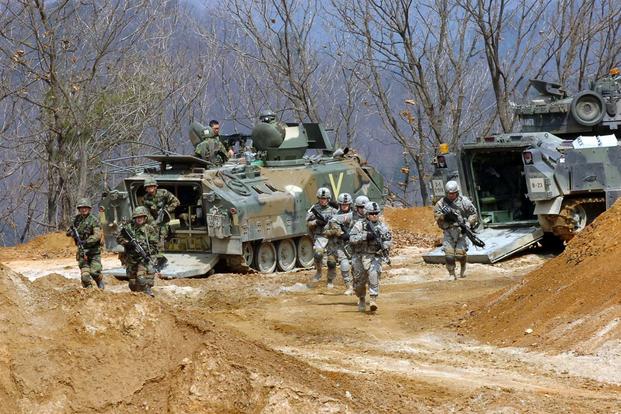U.S. strategic bombers continue to fly show-of-force missions over Korea, but soldiers stationed on the peninsula say the mood is a lot less tense than it appears on social media.
For months, tensions have risen between Washington and Pyongyang over North Korea's continued ballistic missile launches and underground nuclear tests aimed at perfecting a miniaturized nuclear warhead capable of fitting on a long-range missile.
In August, U.S. President Donald Trump warned North Korea that it would be met with "fire and fury like the world has never seen" if Kim Jong Un continues to make threats against the United States.
Images of B-1 Lancer bombers, flanked by F-35B stealth fighters and F-15 South Korean fighters have flooded news and social media sites with a sense of dread.
If war breaks out in Korea, soldiers from the 2nd Infantry Division will be the first to face its destructive power. Soldiers there maintain a heightened state of readiness, but say they don't spend their time worrying about the situation.
"We've got that heightened sense of security, but we still continue on as if it's a regular day. We are prepared for the worst, but there is really no need for everybody to be that worked up," Sgt. 1st Class Perry Willett, chief of fires for 6th Battalion, 37th Field Artillery, Multi-Launch Rocket System, told Military.com on Thursday on the 100th anniversary of the 2nd Infantry Division.
A veteran of deployments to Iraq and Afghanistan, the 34-year-old acknowledged that a serious situation exists on the peninsula, but said South Korea is no war zone.
"Honestly, if you took away social media and the news right now and just sent somebody over here, they would never know that anything was going on," he said. "A lot of people are making it out to be something that it's not over here in South Korea. Nobody is packing up their shops and heading down south just yet."
There are some veterans like himself, but "a lot of the soldiers we get here in Korea are straight out of training, and that is why we have such a high level of training here to get those soldiers prepared," Willett said.
The challenge is striking a balance between being ready at all times and ensuring that soldiers have time to relax and unwind, he said.
"We don't want them to put it out of our minds. When soldiers just put it out of their minds, they become complacent," Willett said. "And they are not ready in case something happens. But to have everybody sitting on edge at all times is not good for the soldiers."
1st Sgt. Mary Myers, also a veteran of Iraq and Afghanistan, said she was surprised at the atmosphere when she arrived in South Korea.
"I have been deployed several times. Coming over here, I expected it to be a little bit more like that because when you are deployed, you are always stressed, you are always tense and expecting something because things do happen," said Myers, who is first sergeant for the 2nd Combat Aviation Brigade's headquarters company.
"Over here, I was surprised to find that I did not feel that same level of anxiety" she said. "I feel more prepared being over here. It might just be that fact that I have experienced it in the past, and I am a higher rank and know more about what is going on."
Myers, 32, spends her days ensuring that her soldiers, many of whom are on their first deployment, are "physically and mentally ready."
"Regardless of what is going on, we train the same way we always train," she said.
Unlike some soldiers, Myers is in Korea with her husband, Chief Warrant Officer 2 Rocky Myers, and her two children.
She admits she is careful of what she tells Elizabeth, who is 5, and Samuel, 3.
"I have a 3-year old and a 5-year-old, and I explain to them that there is a threat -- that sometimes North Korea does not always want to play nice with South Korea," Myers said. "That is pretty much the extent that I go into it with my young children because of their ages. I want them to be prepared if something happens."
But the days in South Korea are pretty normal, she said, describing soccer practices and school plays.
"I feel like there are a lot of people that don't want to come to Korea because of things that they have heard about being here and being worried about bringing their families over here," Myers said.
"There are so many opportunities for soldiers and their families here in Korea -- just a chance to go to Seoul on a weekend. It's amazing. There is so much to do for kids," she said.
But Myers didn't feel this way at first.
"When I first got to Korea, and I started hearing about some of the threats and how we would evacuate our families, I did for a little while think, 'What have I done?' And I was a little upset with myself for the decision I had made," she said.
"But as I saw everything play out and how prepared this unit is and how ready they are to take care of our families -- that thought went away and I was extremely glad that I didn't choose to stay away from my kids for a year," Myers said.
Tragedies such as the recent mass shooting in Las Vegas that killed 58 people and wounded more than 500 are a reminder to Myers that there are no truly safe places to live.
"Even if you are living in the United States, I mean you can't protect them from everything," she said. "There are shootings ... I mean you are taking the same risks no matter where you are."
-- Matthew Cox can be reached at matthew.cox@military.com.





























